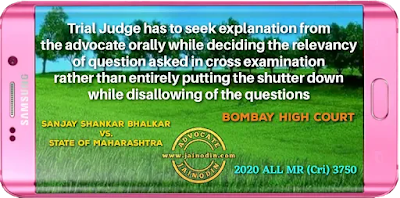In the Supreme Court's case relied upon by both the Advocates it has been held as under :--
"The adversary system of trial being what it is there is an unfortunate tendency for a Judge presiding over a trial to assume the role of a referee or an umpire and to all the trial to develop into a contest between the prosecution and the defence with the inevitable distortions flowing from combative and competitive elements entering the trial procedure. If a Criminal Court is to be an effective instrument in dispensing justice, the Presiding Judge must cease to be a spectator and a mere recording machine. He must become a participant in the trial by evincing intelligent active interest by putting questions to witnesses in order to ascertain the truth. But this he must do, without unduly trespassing upon the functions of the public prosecutor and the defence Counsel, without any hint of partisanship and without appearing to frighten or bully witnesses. Any questions put by the Judge must be so as not to frighten, coerce, confuse or intimidate the witnesses."
"We may go further than Lord Denning and say that it is the duty of a Judge to discover the truth and for that purpose he may "ask any question, in any form, at any time, of any witness, or of the parties, about any fact, relevant or irrelevant" (section 165, Evidence Act). But this he must do, without unduly trespassing upon the functions of the public prosecutor and the defence Counsel, without any hint of partisanship and without appearing to frighten or bully witnesses. He must take the prosecution and the defence with him. The Court, the prosecution and the defence must work as a team whose goal is justice, a team whose caption is the Judge. The Judge, like the conductor of a choir, must, by force of personality, induce his team to work in harmony: subdue the raucous, encourage the timid, conspire with the young, fatter the old."
"The questions put by the learned Sessions Judge, particularly the threats held out to the witnesses that if they changed their statements they would involve themselves in prosecutions for perjury were certainly intimidating, coming as they did from the presiding Judge. The learned Sessions Judge appeared to have become irate that the witnesses were not sticking to the statements made by them under sections 161 and 164 and were probably giving false evidence before him.In an effort to compel them to speak what he thought must be the truth, the learned Sessions Judge, very wrongly, in our opinion firmly rebuked them and virtually threatened them with prosecutions for perjury. He left his seat and entered the ring, we may say. The principle of fair trial was abandoned. We find it impossible to justify the attitude adopted by the Sessions Judge and we also find it impossible to accept any portion of the evidence of P.Ws. 8 and 9, the two alleged eye witnesses."
It is clear that even though the Court is not supposed to assume the role of a referee or an umpire and to allow the trial to develop into a contest between the prosecution and the defence, and even though the Court is not supposed to be silent spectator to the examination-in-chief or cross examination,
the court should not assume the role of prosecution or defence lawyer and put the questions to the witnesses to jeopardise the prosecution case or the defence of the accused. [Para No.8]

It is true that u/s 165 of the Evidence Act ample powers have been given to the Court to have effective and proper control over the trial and Court can ask any question, in any form, at any time. This is an absolute power given to the Court. However, the power has to be used sparingly and only when the circumstances justify its use.





